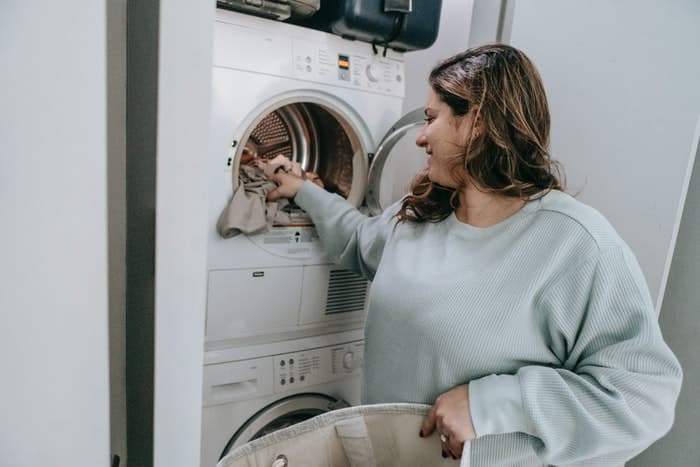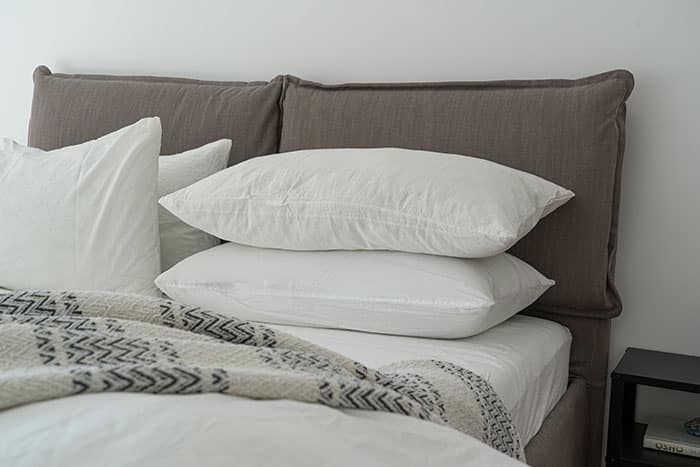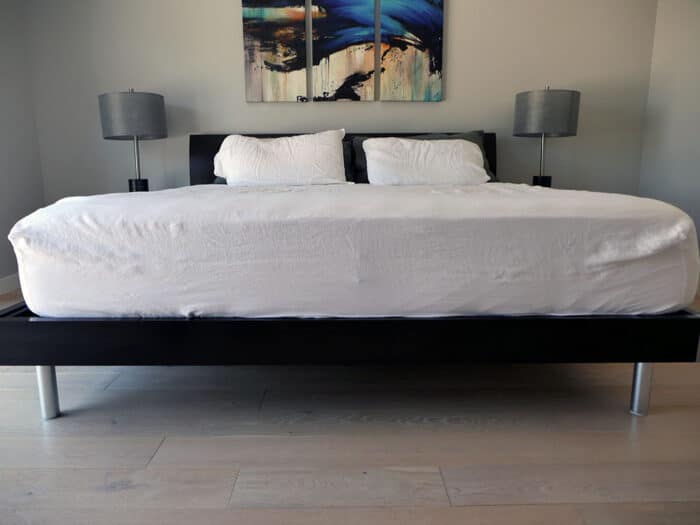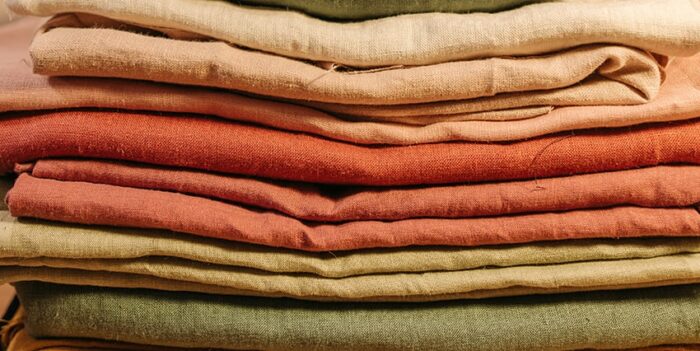Buying a new set of sheets requires some thought, given that we spend nearly half of our lifetime in bed. While it’s important to choose the right size and colors, you also need to consider their threat count, materials, and overall quality.

Two of the most popular fabrics used for bedsheets are cotton and polyester. The former has a higher price tag, but it’s softer and more breathable. Polyester sheets, on the other hand, are less prone to wrinkling and more durable.
That said, here’s what you should know about polyester vs. cotton sheets so you can make the right choice.
In This Guide
Differences | Pros & Cons of Cotton | Pros & Cons of Polyester | Fabric Types | Summary
What’s the Difference Between Cotton and Polyester?
Cotton is a natural fiber derived from the plant with the same name. Manufacturers process the seed pods of the cotton plant into fibers and then spin them into threads.

By comparison, polyester is a synthetic fiber made from natural gas and petroleum. These compounds are processed at high temperatures until they form a viscous mass. The latter undergoes further processing, resulting in long threads.
Another difference between the two is that cotton fibers have hollow openings, or lumens, along their length. This allows them to absorb up to 27 times their weight in water, wicking away moisture. At the same time, they promote airflow and keep you cool.
Pros and Cons of Cotton Sheets
Cotton sheets are highly absorbable, breathable, and soft, offering superior comfort. They can be a good choice for hot sleepers and people who are allergic to polyester or have sensitive skin.
Moreover, cotton sheets (and clothes) get softer with every wash. They’re silky-smooth right off the bat and may feel even better against your skin as time goes by.

The downside is that they absorb sweat and stains, which can reduce their lifespan. Plus, they’re prone to mold growth due to their high porosity. So, if you sweat a lot and don’t wash your sheets to dry, they can turn into a health hazard.
Overall, cotton sheets require higher maintenance because they’re susceptible to stains, wrinkles, and creases. They may also shrink by 3-5% after the first wash, or up to 10% if the fabric hasn’t been pre-shrunk during manufacturing.
Pros
- Highly breathable
- Hypoallergenic
- Sustainable and eco-friendly
- Suitable for sensitive skin
- Feels soft from the start
- Moisture wicking
- Keeps you cool at night
- Doesn’t pill
Cons
- Can shrink during washing
- Prone to wrinkles and creases
- May fade in color over time
- Less durable than polyester
- Absorbs sweat and stains
- Susceptible to mold growth
- Can be expensive
However, note that cotton sheets vary in quality, depending on their thread count, ply, composition, and other factors.
For example, Egyptian cotton sheets can last five to 10 years and have a luxurious feel to them. But if the sheets are made from low-quality cotton, they may last only a few months and feel scratchy rather than soft.
Pros and Cons of Polyester Sheets
Polyester sheets are often perceived as of lower quality than cotton sheets, but that’s not necessarily the case.
Generally, polyester is easier to maintain and more durable than cotton. It also retains its shape and color and doesn’t shrink during washing. Plus, it dries quickly and doesn’t form wrinkles.

Since this fabric consists of synthetic polymers (similar to those used in plastic products), it’s more resistant than silk, cotton, or linen. Therefore, it’s less likely to rip or tear.
Additionally, polyester sheets often cost less than cotton bedsheets. They’re not as smooth and silky but tend to become softer over time.
The downside is that polyester doesn’t soak up moisture and has poor breathability. As a result, it can trap heat and increase sweating. It’s also prone to pilling and conducts static electricity, attracting dust and debris.
It’s also worth mentioning that polyester can irritate the skin or cause allergic reactions. While not everyone will experience these issues, it’s something you should take into account if you have sensitive skin.
Pros
- High durability
- Easy to maintain
- Lightweight
- Low tendency to wrinkle
- Doesn’t shrink during washing
- Maintain its color for longer
- May become softer over time
- More affordable than cotton
Cons
- Can trap heat and moisture
- Prone to pilling
- Tends to absorb oils
- Can irritate sensitive skin
- May cause allergic reactions
- Attract dust, debris, and hairs
- Not environmentally-friendly
Just like cotton linens, polyester sheets vary in quality. For instance, some models have cooling properties, which may keep you from overheating during sleep. Others are hypoallergenic, making them suitable for people with sensitive skin.
Consider the Type of Fabric
Both cotton and polyester sheets come in different types, depending on their composition, thread count, and overall quality.
For example, Egyptian and Supima cotton sheets are made from the extra-long staple fibers of the Gossypium barbadense plant, also known as sea island cotton. They’re prized for their softness, breathability, and durability, offering increased comfort.

Cotton jersey sheets don’t have the same luxurious feel, but they’re wrinkle-resistant, stretchy, and easy to care for.
Flannel sheets, on the other hand, are best known for their insulating properties. They keep you cool in the summer and warm in the winter, making them suitable for both cold and hot sleepers.
Similarly, polyester bed sheets are more or less breathable and vary in quality.
For instance, microfiber sheets are wrinkle-resistant and durable, with a smooth, slippery feel. They’re less breathable but easier to care for than cotton.

Some bed linens are made from cotton and polyester fibers. These tend to be softer and thicker than pure polyester sheets and cheaper than cotton bed sheets.
For a stretchy and comfortable feel, consider buying jersey polyester sheets. They’re soft, breathable, and resistant to wrinkles, with a casual look.
Polyester vs. Cotton Sheets: Which Fabric Is Right for You?
Generally, cotton sheets are suitable for hot sleepers, people with sensitive skin, and those who value sustainability.
Polyester bed sheets, on the other hand, are very durable and easy to care for. Plus, they tend to be more affordable than cotton.

For example, a family with small children may prefer polyester sheets for their durability and low maintenance. However, flannel or jersey cotton sheets will work, too, since they’re wrinkle-resistant and durable.
Either fabric can be a good choice, depending on what you’re looking for. Consider your budget, preferences, and sleeping habits, as well as the convenience factor. Egyptian cotton sheets may offer that luxurious feel you want, but they’re high maintenance and run on the pricey side.



